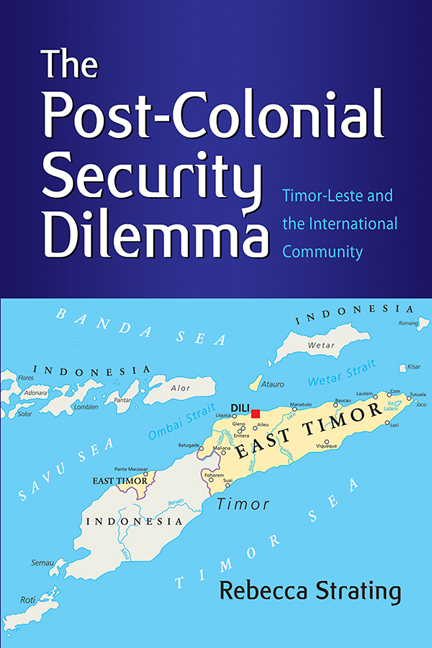Book contents
- Frontmatter
- Contents
- List of Tables
- Acknowledgements
- 1 Introduction
- 2 The Struggle for Recognition: Territorialization, Self-determination and the Imagining of “East Timor”
- 3 The Politics of Recognition: East Timor and the International Community
- 4 Establishing Legitimacy: International State-building in East Timor
- 5 Timor-Leste's Aspirational Foreign Policy
- 6 Identity Hedging: Timor-Leste's Engagement with Intergovernmental Organizations
- 7 Timor-Leste's National Security Agenda
- 8 Securing Economic Sovereignty
- 9 International Reconciliation and Transitional Justice
- 10 Conclusion: Timor-Leste in the Changing Regional Order
- Postscript
- Bibliography
- Index
- About the Author
7 - Timor-Leste's National Security Agenda
Published online by Cambridge University Press: 16 May 2019
- Frontmatter
- Contents
- List of Tables
- Acknowledgements
- 1 Introduction
- 2 The Struggle for Recognition: Territorialization, Self-determination and the Imagining of “East Timor”
- 3 The Politics of Recognition: East Timor and the International Community
- 4 Establishing Legitimacy: International State-building in East Timor
- 5 Timor-Leste's Aspirational Foreign Policy
- 6 Identity Hedging: Timor-Leste's Engagement with Intergovernmental Organizations
- 7 Timor-Leste's National Security Agenda
- 8 Securing Economic Sovereignty
- 9 International Reconciliation and Transitional Justice
- 10 Conclusion: Timor-Leste in the Changing Regional Order
- Postscript
- Bibliography
- Index
- About the Author
Summary
While the previous chapter demonstrated the centrality of cooperation within diverse multilateral forums as part of Timor-Leste's foreign policy, political rhetoric and policies tend to straddle the line between contest and cooperation. This chapter identifies how Timor-Leste perceives its external security challenges and the steps it has taken to address them. Engaging with “security” requires considering what security and for whom. The conventional sovereignty-security nexus focuses on the defence capabilities of the state in protecting its territory and population from aggression by other states. This chapter argues that this conventional approach to “national security” is viewed by dominant political elites as integral to the independence of the Timorese state. This sovereignty-security conception is shaped by Timor-Leste's historical experiences with colonialism under Portugal and Indonesia, and the collusion of Western and ASEAN states in permitting illegal occupation. Timor-Leste's leaders have presented an image of the international environment as insecure and competitive in some contexts. They suggest Timor-Leste should devote more resources to building military capacities to guarantee its sovereignty. Like many states, however, defence self-reliance is an unattainable goal.
Small states have been viewed as particularly vulnerable to the power politics because their limited assets make it difficult to repel foreign combatants. Timor-Leste's external security threats, however, are mostly low-level and non-traditional (e.g. non-military), including transnational crimes such as the illegal movement of goods and people across porous sections of the borders between Indonesia and Timor-Leste. Maritime security has also been identified as a priority by multiple sources, with Timor-Leste government arguing that a naval force is required to protect against illegal fishing, destruction of maritime fauna, piracy and other violations of Timor-Leste's Exclusive Economic Zone (EEZ). East Timorese leaders, such as Xanana Gusmão, have targeted global security issues such as terrorism, trafficking of people, humans and weapons and international crime as potential threats to Timor-Leste's national security.
While realist approaches to external national security may be relevant for great power politics and material security interests among long-established, “Westphalian” states, they are generally less useful for explaining the post-colonial security dilemmas of new states in which threats generally emerge from within borders rather than beyond. Generally speaking, new states such as Timor-Leste are more likely to experience internal conflict and disorder than established, industrialized states. As the introduction outlined, the security dilemma for many developing states “arises in meeting internal rather than external threats”.
- Type
- Chapter
- Information
- The Post-Colonial Security DilemmaTimor-Leste and the International Community, pp. 199 - 234Publisher: ISEAS–Yusof Ishak InstitutePrint publication year: 2018

